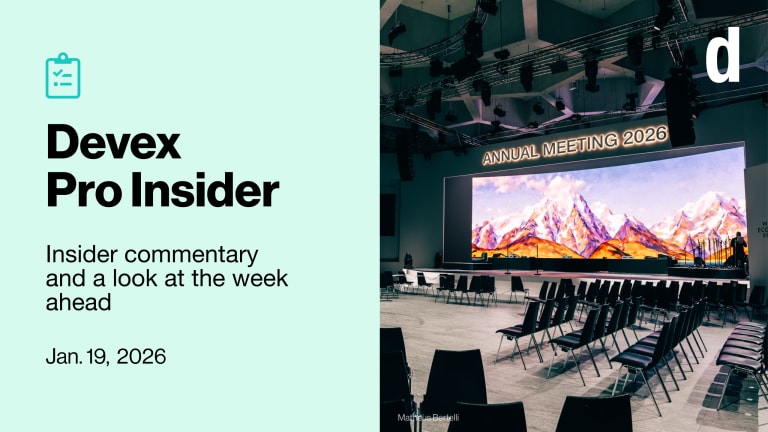
DAVOS, Switzerland — Finance ministers are in demand and it’s a trend that seems to be picking up in intensity. When we put on a Devex event — like the ones we’re hosting this week during the World Economic Forum Annual Meeting in Davos — it’s not just development celebrities or foundation presidents our underwriters and partners are after: More often now, it’s finance ministers.
Of all the underlying trends changing the way global development works — among them poor people rapidly becoming digitally identified, connected, and banked, and the rise of results-based-aid — perhaps the most immediately salient is what the growing importance of finance ministers shows: The power of financial dealmaking.
Devex @ Davos
We’re on the ground in Davos and bringing you coverage of what the World Economic Forum Annual Meetings mean for development. Follow us on social and sign up for our daily morning briefings.
There’s nothing new about looking for money under every rock to solve global challenges. What’s new is the potential to use innovative tools to blend together different kinds of funding — just at the moment that’s needed most. It’s what’s known as the “billions to trillions” agenda, and it’s a way to raise the whole new level of finance the SDGs require. It’s tailor made for Davos.
The annual meeting in this Swiss ski town has long been known as a place where deals get made: Some are officially supported by the World Economic Forum such as the vaccine initiatives Gavi and CEPI; many more are business transactions among the billionaires and corporate titans gathering here. Now that global development has entered an era of financial innovation, Davos has more relevance than ever.
We’re entering an era of Davos dealmaking for development. A kind of financial engineering for good. Picture billionaire philanthropists, corporate titans, NGO chiefs, multilateral development bank presidents, aid agency heads, and, yes, finance ministers from the Global South, plotting and planning together.
At Davos this year, we’ll be on the lookout for these kinds of deals. Development Impact Bonds — famously difficult to structure and launch because of the many counter-parties required — will be on the unofficial Davos agenda. For all the promise of DIBs, just a handful exist today, but perhaps others will get their start here this week. So too deals such as the Global Financing Facility that aim to capture for health spending part of the economic growth happening in so many developing countries. Imagine structures like that — which incentivize spending on health and education by governments, de-risk private investments, utilize market mechanisms, leverage precious foreign aid, and mobilize philanthropic capital — but extended to more sectors and countries.
The drivers of all this dealmaking will be on full display this week. Presidents and prime ministers of the largest Western aid donors will be on site — among them President Donald Trump, Chancellor Angela Merkel, Prime Minister Theresa May, and President Emmanuel Macron — but foreign assistance is unlikely to be the thrust of their message as they aim to address populism at home.
Instead, it’s the tidal wave of billionaire philanthropists — led by Bill Gates, who will be in Davos and who has agreed to an interview with Devex — and the finance ministers from big developing economies — such as India’s Arun Jaitley and South Africa’s Malusi Gigaba — who will dominate the development conversation. So too leaders of the big development institutions, among them the World Bank’s Kristalina Georgieva, ADB’s Takehiko Nakao, USAID’s Mark Green, and AIIB’s Jin Liqun.
Lots of energy will no doubt be spent on blockchain and artificial intelligence and their many applications for global development. Participants this week will have a chance to sample the laboratory grown synthetic meat alternative known as the “Impossible Burger” — a plant-based meat so real it bleeds — which has the potential to upend the environmentally devastating factory farm industry. And there will be the usual — and important — announcements about philanthropic initiatives and corporate social responsibility.
We’ll also be taking the pulse of the global community on the SDGs and humanitarian crises — two items that were very much on the agenda last year. We’re eager to see if populism in the West diminishes interest in these global issues.
But most of all, Davos is about deals. What deals could be made this year on global health, renewable energy, education, and more? Stay tuned.
Subscribe here for our daily morning briefings from Davos.








